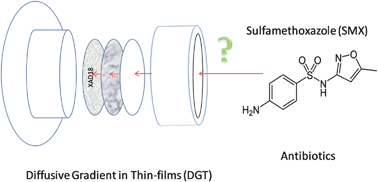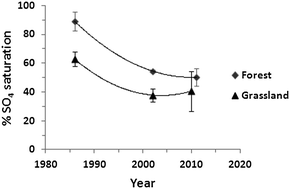 The first HOT article this week comes from Kevin Jones and colleagues at Lancaster University, who have developed a novel passive sampler using diffusive gradients in thin films (DGT) for organics in the aquatic environment. The sampler can measure quantitatively without field calibration.
The first HOT article this week comes from Kevin Jones and colleagues at Lancaster University, who have developed a novel passive sampler using diffusive gradients in thin films (DGT) for organics in the aquatic environment. The sampler can measure quantitatively without field calibration.
The team indicate that the sampler could be used to investigate bioavailability and interactions of organic compounds (including pharmaceutical antibiotics) in soils and sediments.
A novel passive water sampler for in situ sampling of antibiotics
Chang-Er Chen, Hao Zhang and Kevin C. Jones
DOI: 10.1039/C2EM30091E
 The second HOT article comes from Steven Hughes and colleagues, who investigated the recovery of sulfate saturated soils in the Plynlimon catchments in mid-Wales, following the reduction between the 1980s and 2011 in atmospheric S inputs.
The second HOT article comes from Steven Hughes and colleagues, who investigated the recovery of sulfate saturated soils in the Plynlimon catchments in mid-Wales, following the reduction between the 1980s and 2011 in atmospheric S inputs.
The team investigated sulfate adsorption and desorption isotherms of stagnopodzol, brown podzolic soil, gleyed podzol and stagnohumic gley B-horizon soils from soil samples collected from sites in the Plynlimon catchments in the 1980s. Additionally, samples collected in 2002 and from 2010 to 2011 from selected sites that were revisited were also analysed for comparison. Some of the soil samples from 2002 were further investigated to study the effects of increasing concentrations of dissolved organic carbon on sulfate adsorption.
Recovery of sulfate saturated soils in the Plynlimon catchments, mid-Wales following reductions in atmospheric S inputs from the 1980s to 2011
Steven Hughes, Brian Reynolds, David A. Norris, Sarah A. Brittain, Ashlee L. Dere, Clive Woods, Linda K. Armstrong, Sarah A. Harman and Heather D. Wickham
DOI: 10.1039/C2EM30070B
Both these papers are free to access for 4 weeks following a simple registration for individual users.










